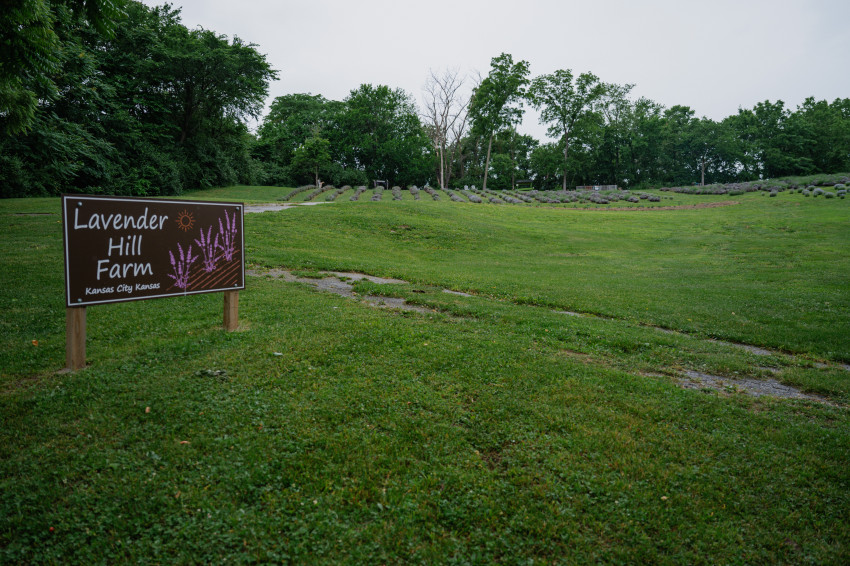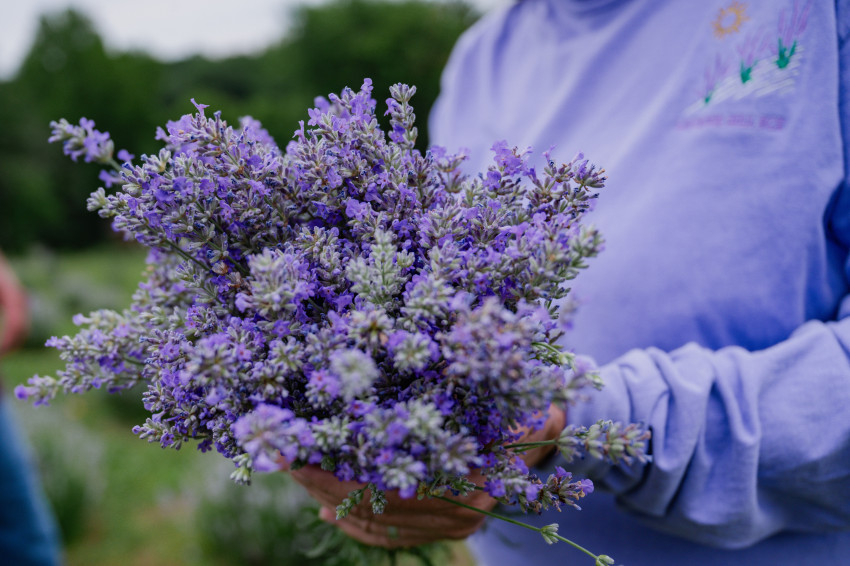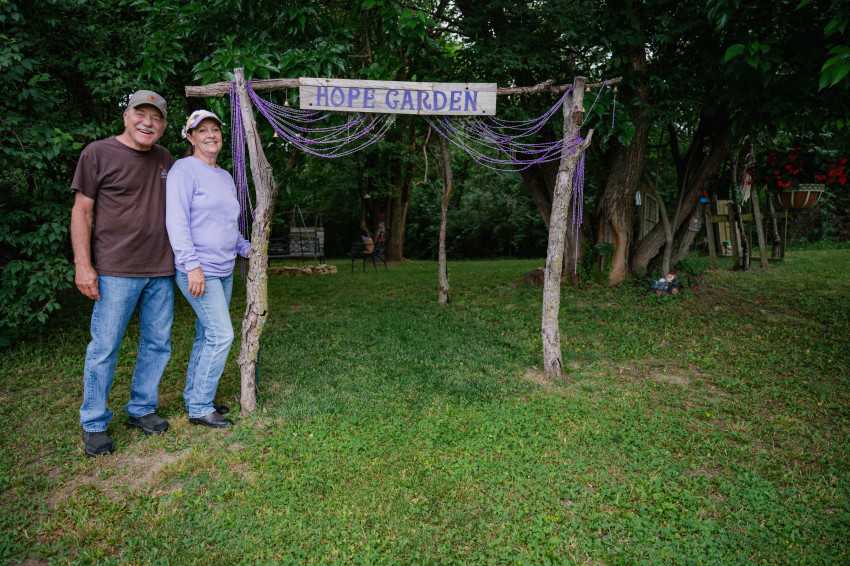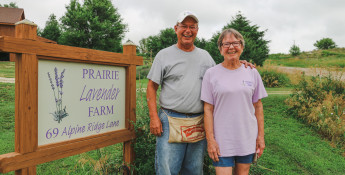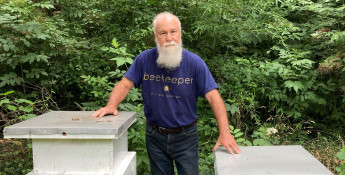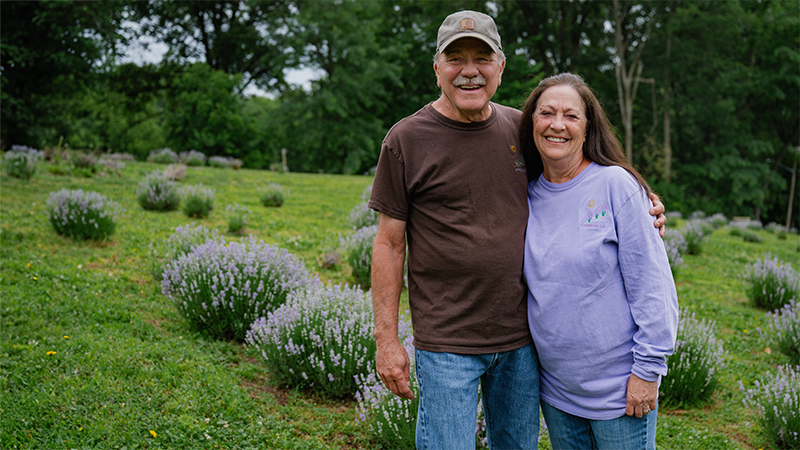By Sheridan Wimmer on July 10, 2024
How a Lavender Field in Kansas Provides Hope For Victims of Human Trafficking
A lavender field in Kansas supports a nonprofit organization with a mission to help women
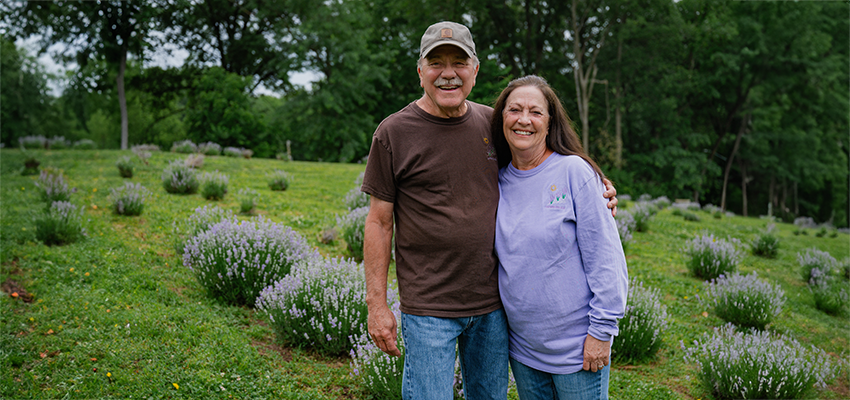
You wouldn’t think a lavender field would be just one mile off I-70 in Wyandotte County where six lanes of traffic merge, exit and pass you going speeds exceeding the speed limit. Past concrete jungles, exit ramps and gas stations sits a plot of land that’s unpaved but developed — in the sort of way that provides peace, hope and a place of comfort for many who have seen a darker side of life.
Lavender Hill Farm, owned by Joe and Jenny Steineger, is aptly named. Lavender bushes grow on a steep hill across the street from where Joe grew up and where one of their three sons, Ben, currently resides. The Steinegers started their lavender farm in 2019, and because they are incredibly kind and giving people, they found a way to share the hill with others who would benefit not only from the positive feeling of tactile work but also from being in the Steinegers’ warm, inviting company.
The hill is a place where the Steinegers have cultured resilience and hope by working with a Kansas City-based organization focused on helping women escape sex trafficking.
Turning pain into purpose
Kansas City has a lot of positives, but like any area, it has a darker side, too. Kansas City is one of the top sex trafficking cities in the country because of the interchange of I-35 and I-70.
Kristy Childs, a survivor of sex trafficking, has made it her life’s mission to help women who have experienced the manipulation and stigma surrounding commercial sexual exploitation. Childs was only 12 when she left her abusive home and was sexually exploited until she found her own strength to forge a new path.
“I was able to extract myself from that world, but it was very difficult,” Childs says. “There were no services available at that time, but I was fortunate to be able to have the strength to pull myself out of it once I saw a way to do it. For the longest time, I was just trapped.”
But before Childs left that life, she met a 14-year-old girl named Veronica April Neverdusky, who was also on the streets in Kansas City surviving after she was kicked out of her home for putting her father in prison for abusing her.
“I didn’t want to get involved with her initially because I had previously helped a girl in Alaska and was beaten for it,” Childs says. “But this girl would follow me around and just talked and talked. Once she told me why she was out there, that was a big ‘aha’ moment for me because I admired her courage to name her abuser. It made me wonder how many other girls and women I’ve known who have never talked about these things. After that, we became very close. She was like my little sister.”
In 1993, Neverdusky was only 21 and a mother of three children when her body was found in a Kansas City park. Her murder remained a cold case until 2007, when a man who was a cab driver confessed to strangling her and another woman, whose body was found two days before Neverdusky’s.
Transforming stigma and creating hope
Childs was transitioning out of prostitution when Neverdusky was murdered, and after job training from a Sister of Charity who operated a program called Keyboards to Success, she got her first job at the Kansas City, Kansas, area Chamber of Commerce. Childs worked there for a couple of years, then went back to El Centro’s Keyboards to Success and worked until a different opportunity presented itself.
“Sister Linda Roth, who was my manager, didn’t know anything about me and my past,” Childs says. “After working with her for a while, I ended up telling her what the Keyboards to Success program meant to me and what it took me out of. I told her I really wanted to help these women who were trapped in that life and to help them realize there’s a way out. After telling her about this, she walked by my desk and said, ‘You’re going to get a call about a job offer.’ I said, ‘But I work for you.’ She didn’t say anything else.”
The call Childs received was an offer of $25,000 seed funding from the Sisters of Charity of Leavenworth to start a program to help victims of trafficking.
Childs started her organization in 2000 and named it after Neverdusky – Veronica’s Voice. Early on, Veronica’s Voice offered a 24-hour crisis hotline and street outreach where survivors of prostitution would help victims with support. The services offered have grown throughout the years to include the purchase of a house where women could live for free for up to two years as they recover and gain skills to build a new life.
“When I left prostitution, I was 36 years old at the time, and it was scary when that life is all you know,” Childs says. “Becoming economically independent away from that was a huge step, and I wanted to help other women learn they can do it too.”
A sanctuary for survivors
The Steinegers became passionate about helping victims of sex trafficking and started by volunteering with Veronica’s Voice in 2016, before the lavender field existed. Childs one day told Jenny she was interested in starting a farm for Veronica’s Voice, and Jenny immediately got to work.
“I told Jenny we needed to start a farm and the next thing I know, we’re running all over the state to these lavender farms because she and Joe had a piece of land,” Childs says. “So, they started a lavender farm.”
Now, through the lavender farm and the products they make, Joe and Jenny donate a portion of their sales to Veronica’s Voice. Recognizing the power of therapeutic environments and meaningful work, the women are also invited to the farm and help create the products that are sold.
“There’s something about being in the lavender field and working with Jenny and Joe that’s really cathartic, therapeutic and healing,” Childs says. “Those two do a lot of hard work and they’re fantastic people.”
This collaboration not only provides a pathway to economic independence but also nurtures emotional and psychological recovery, creating a holistic approach to healing and empowerment.
“Some of the people who have come to this hill have told us how they feel so loved here,” Joe says. “I tell them of course we love them, but it’s hard for them since they came from that world to understand that people really do love them. It really helps them, but it helps Jenny and me too. It enriches your life to give into other peoples’ lives.”
The lavender field has served the Steineger family with its connection to Veronica’s Voice and creating lavender products sold at farmers markets, but the most personal connection is with their son, Ben.
The same year the Steinegers planted their lavender, Ben checked himself into a recovery center for the third time.
“We’re so joyful to see him alive because I thought every day that I was going to get a phone call that my son was dead from an overdose,” Jenny says. “We’re proud he was able to get the help he needed before that phone call came.”
Ben’s recovery journey wasn’t easy, but through his parents’ love, surrounding himself with the right people and a hill full of lavender, he has been clean for five years and has been studying herbalism – a perfect fit with a lavender farm across the street.
Just a mile away, cars are hurrying to their destinations, likely oblivious of the little lavender farm on a hill that’s made such a profound impact.
“What Jenny and Joe have done is such a beautiful testament of their hearts,” Childs says.
A beautiful, lavender-scented testament.
If you are in danger, or know someone who is, the National Human Trafficking Hotline offers a 24/7 confidential number and texting service. Visit humantraffickinghotline.org/en.
For more information about Veronica’s Voice, visit www.veronicasvoice.org. To learn more about Lavender Hill Farm and to purchase their products, visit www.lavenderhillkck.com.

